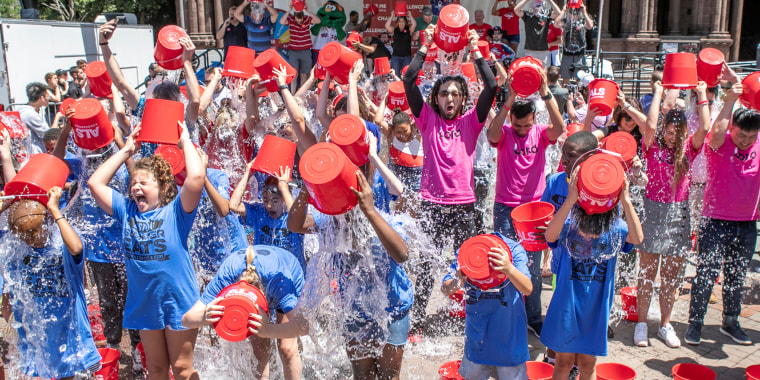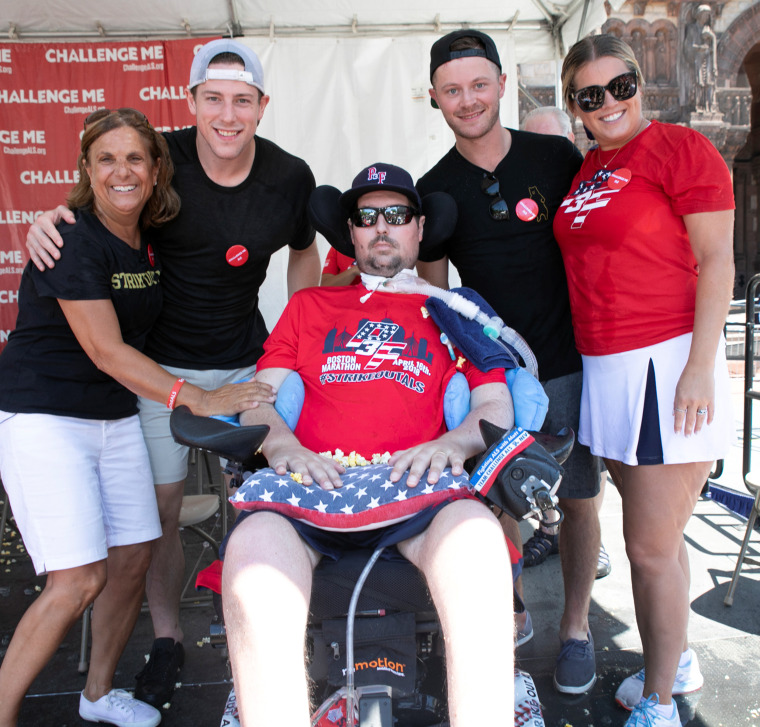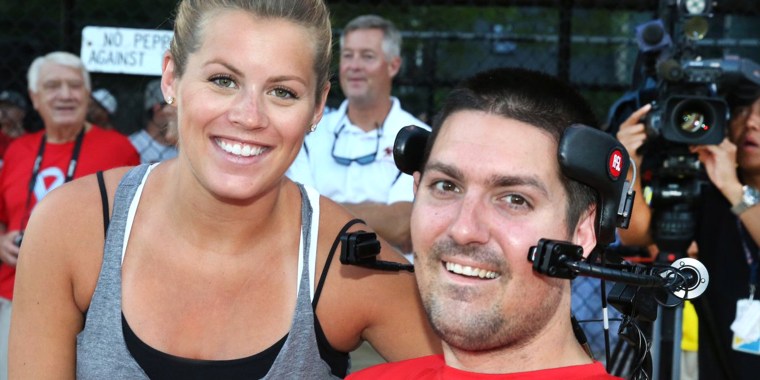Pete Frates has become a symbol of hope for people with ALS just by simply living his life with his wife and daughter in the five years since he helped make the Ice Bucket Challenge a worldwide phenomenon.
Frates, 34, who has been living with amyotrophic lateral sclerosis for seven years, helped inspire a viral social media movement that has had tangible effects on those living with ALS and those who will be diagnosed in the future.
"Here we are five years later, you dumped water over your head, where are we now?" Pete's mother, Nancy Frates, told TODAY. "The proof of a movement is in its results. Today we have over 80 drugs in the ALS pipeline and that relates back to money donated during the Ice Bucket Challenge."

The average life expectancy for people with ALS, a progressive neurodegenerative disease that affects nerve cells in the brain and spinal cord, is two to five years, according to the ALS Association. Frates, a former captain of the Boston College baseball team, can no longer walk or talk, but is still able to enjoy life with his wife, Julie, and their daughter, Lucy.
"As far as Lucy has ever known, Pete's never spoken out loud,'' Julie told TODAY. "That's very normal to her. She's a normal 4-year-old, she's all over him, climbing right on top of him. That's her dad as she knows him, and it's definitely a special bond."
"Pete is living,'' Nancy said. "He went out for Halloween with Lucy and Julie, he watches Patriots games with his brother and father, and at night, he is a father to his little girl just like any other father. They read books together and they watch movies."
Trying to keep a semblance of normalcy has had enormous benefits for Frates.
"We'll go out to dinner or will just be out with Lucy doing normal things and people are kind of astonished about it,'' Julie said. "We appreciate the small things more than the average person."
The level of home care he receives from a team of nurses has been crucial in extending his quality of life.
"Pete is alive today because of three factors,'' Nancy said. "His sheer will and determination as a Division I athlete, the love of Lucy and Julie, and the level of care that he gets.
"We are a blessed family, because we have a number of supporters who help with the tremendous bills because it takes a full-time, very skilled medical nurse who can identify any fatal problems immediately. It would be too late if we were taking care of him."
His condition has worsened to where the energy in his eyes has subsided, so he's lost the ability use his eye movement to type on his Eyegaze machine to communicate. The family has to ask him yes and no questions and have him blink, but has found a way to make it work.

"It's an amazing thing to witness to see how a disease has completely ravaged his physical body, but his spirit and soul lives on,'' Nancy said.
His spirit is what helped propel the Ice Bucket Challenge to a ubiquitous place on social media in the summer of 2014, when everyone from former President George W. Bush to the TODAY anchors to Martha Stewart was dumping ice water over their heads to raise money to fight ALS.
Frates had already amassed a strong group of supporters in the the first two years after he was diagnosed when he was contacted by Pat Quinn, a New York man with ALS, to spread the campaign.
The Ice Bucket Challenge had begun when Chris Kennedy, a golfer from Florida, nominated the wife of Anthony Senerchia, who was living with ALS, to dump a bucket of icewater on her head. Senerchia's story reached Quinn and then grew exponentially after Frates and his wide circle of friends began posting videos.
About 17 million people uploaded videos of themselves doing the Ice Bucket Challenge that received more than 10 billion total views, according to the ALS Association.
"Since 2014, we’ve seen new ALS genes discovered, promising new treatments in the pipeline, new global research collaborations, and greater access to care for people with ALS," Calaneet Balas, president and CEO of the ALS Association, told TODAY in a statement.
The money raised by the Ice Bucket Challenge led to the discovery of five new genes connected to ALS. The ALS Association expanded its clinical network by 50% and committed nearly $90 million in research funding between 2014 and 2018.
"The Ice Bucket Challenge was the paradigm shift in a disease base that had been relatively status quo for 150 years,'' Nancy Frates said. "We showed you could raise $220 million in two weeks by opening up the world of philanthropy on social media. The 'donate' button that was added on Facebook has a direct link to the Ice Bucket Challenge."
The Peter Frates Family Foundation has also been formed to provide financial help to the families of those living with ALS.
"The need for home healthcare is going to exponentially rise because people are going to be living longer with the disease,'' Nancy Frates said. "A recent ALS Association survey found that people with ALS don't want to put a financial burden on their family, so people are choosing to die because of money. It's unacceptable.
"The key is to keep the patient in the home to surround them with the family who loves them. This disease is still fatal, but while you're living with the disease you should be able to stay home if that's your choice."
The Ice Bucket Challenge was an incredible success, but the disease still has no cure, so the fight is not over yet.
"The five-year anniversary is not just a celebration of the movement, it's also a call to action,'' Nancy said. "It's a thank you for what you did five years ago, but now stay with us because we're almost there and we just need you to get over the hump.
"In 2012, we felt hopeless. Today there is real hope."
